US President Donald Trump on Thursday invoked emergency powers to boost domestic production of critical minerals used widely across the economy as part of a broad effort to offset China’s near-total control of the sector.
The move is the latest by Trump to increase US energy and minerals production, and comes amid an escalating trade conflict with China, Canada and other large minerals producers that supply US manufacturers.
Lithium, nickel and other critical minerals are used in many electronics, and demand is expected to surge in the coming years for production of electric-vehicle batteries. China is the world’s largest producer or processor of many critical minerals.

Photo: Reuters
Trump signed an executive order that taps the Cold War-era Defense Production Act (DPA) as part of an effort to provide financing, loans and other investment support to domestically process a range of critical minerals.
The DPA gives the Pentagon wide berth to procure equipment necessary for national defense. Invoking it essentially declares that relying on rival nations for critical minerals constitutes a national security threat.
“The United States was once the world’s largest producer of lucrative minerals, but overbearing federal regulation has eroded our nation’s mineral production,” the president said in the order.
The order directs federal agencies to create a list of US mines that can be quickly approved as well as which federal lands, including those controlled by the Pentagon, could be used for minerals processing.
The US currently produces very little lithium and nickel; its only cobalt mine shuttered last year amid intense Chinese competition. The US does have multiple copper mines, but only two smelters to process the red metal into pipes, wiring and other components. The US has only one mine for rare earths, which are used to make magnets that turn power into motion.
Late last year, Beijing imposed an outright ban on exports of gallium, germanium and antimony to the US, causing US manufacturers to scramble for alternative supplies of those niche, but vital materials.
The order also encourages faster permits for mining and processing projects and a directive for the US Department of the Interior to prioritize mineral production on federal land.
The order directs agencies to help boost US output of copper and gold, neither of which is considered a critical mineral by the US Geological Survey.
An executive order from Trump had long been sought by US miners, many of which had long complained that bureaucratic delays hampered output.
“Ramping up American mining is a national security imperative and President Trump’s strong action recognizes that,” said Rich Nolan, head of the National Mining Association trade group.
The Defense Production Act is a 1950 law that former US president Harry Truman deployed to ramp up steel production for the Korean War.
Former US president Joe Biden also invoked the law to encourage domestic production of critical minerals, adding battery materials such as lithium, nickel, graphite, cobalt and manganese to the list of items covered under the measure to help companies access US$750 million in funds.
Former Newmont executive David Copley has been named to oversee the mining portfolio for the US National Energy Dominance Council, two sources familiar with the appointment told Reuters.
Copley will be the highest-ranking person in the federal government shaping mining policy, one of the sources said.
Trump also said on Thursday that the US would sign a minerals and natural resources deal with Ukraine shortly. Last month, he ordered a probe into potential new tariffs on copper imports.

Quanta Computer Inc (廣達) chairman Barry Lam (林百里) is expected to share his views about the artificial intelligence (AI) industry’s prospects during his speech at the company’s 37th anniversary ceremony, as AI servers have become a new growth engine for the equipment manufacturing service provider. Lam’s speech is much anticipated, as Quanta has risen as one of the world’s major AI server suppliers. The company reported a 30 percent year-on-year growth in consolidated revenue to NT$1.41 trillion (US$43.35 billion) last year, thanks to fast-growing demand for servers, especially those with AI capabilities. The company told investors in November last year that

Intel Corp has named Tasha Chuang (莊蓓瑜) to lead Intel Taiwan in a bid to reinforce relations between the company and its Taiwanese partners. The appointment of Chuang as general manager for Intel Taiwan takes effect on Thursday, the firm said in a statement yesterday. Chuang is to lead her team in Taiwan to pursue product development and sales growth in an effort to reinforce the company’s ties with its partners and clients, Intel said. Chuang was previously in charge of managing Intel’s ties with leading Taiwanese PC brand Asustek Computer Inc (華碩), which included helping Asustek strengthen its global businesses, the company

United Microelectronics Corp (UMC, 聯電) forecast that its wafer shipments this quarter would grow up to 7 percent sequentially and the factory utilization rate would rise to 75 percent, indicating that customers did not alter their ordering behavior due to the US President Donald Trump’s capricious US tariff policies. However, the uncertainty about US tariffs has weighed on the chipmaker’s business visibility for the second half of this year, UMC chief financial officer Liu Chi-tung (劉啟東) said at an online earnings conference yesterday. “Although the escalating trade tensions and global tariff policies have increased uncertainty in the semiconductor industry, we have not

Power supply and electronic components maker Delta Electronics Inc (台達電) yesterday said it plans to ship its new 1 megawatt charging systems for electric trucks and buses in the first half of next year at the earliest. The new charging piles, which deliver up to 1 megawatt of charging power, are designed for heavy-duty electric vehicles, and support a maximum current of 1,500 amperes and output of 1,250 volts, Delta said in a news release. “If everything goes smoothly, we could begin shipping those new charging systems as early as in the first half of next year,” a company official said. The new